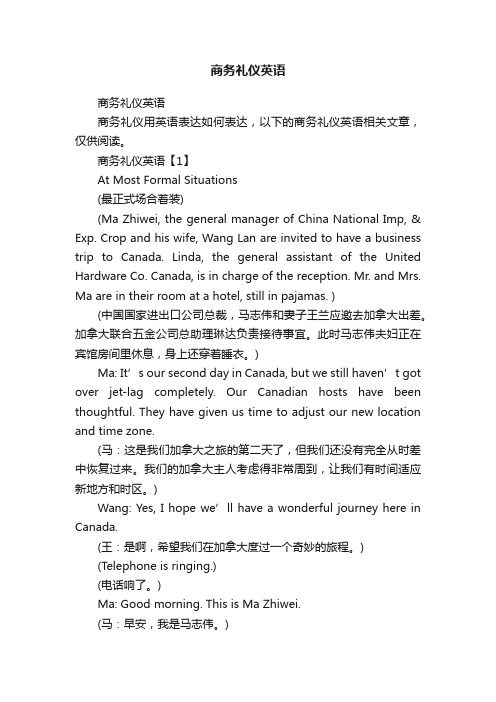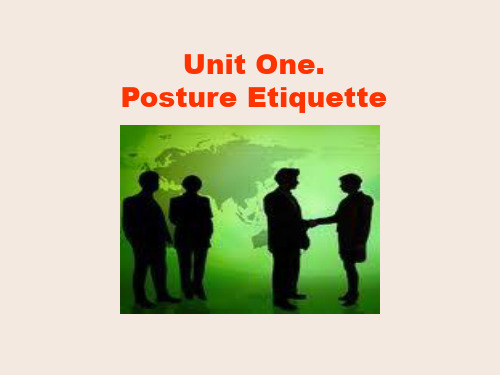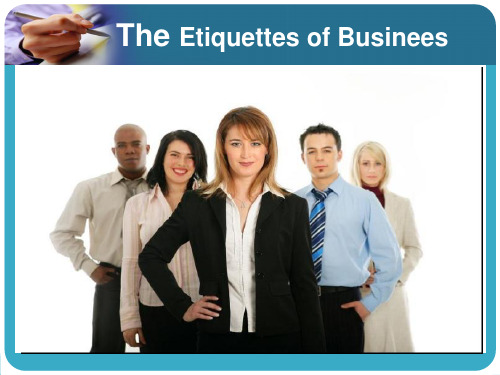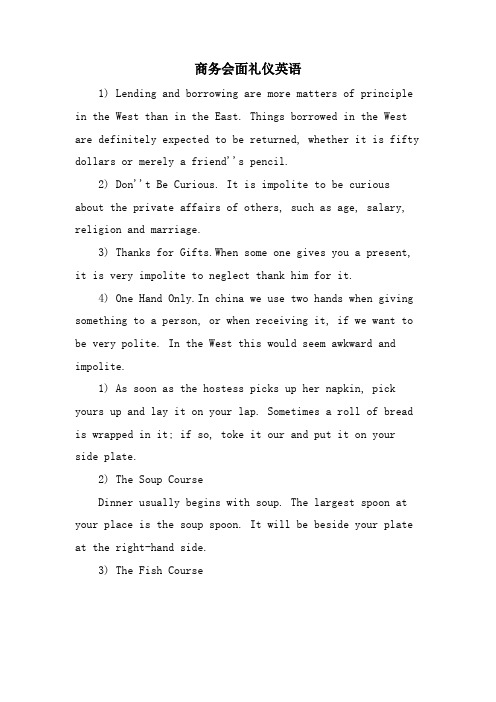商务礼仪英语中英文对照
商务礼仪英语

商务礼仪英语商务礼仪英语商务礼仪用英语表达如何表达,以下的商务礼仪英语相关文章,仅供阅读。
商务礼仪英语【1】At Most Formal Situations(最正式场合着装)(Ma Zhiwei, the general manager of China National Imp, & Exp. Crop and his wife, Wang Lan are invited to have a business trip to Canada. Linda, the general assistant of the United Hardware Co. Canada, is in charge of the reception. Mr. and Mrs. Ma are in their room at a hotel, still in pajamas. )(中国国家进出口公司总裁,马志伟和妻子王兰应邀去加拿大出差。
加拿大联合五金公司总助理琳达负责接待事宜。
此时马志伟夫妇正在宾馆房间里休息,身上还穿着睡衣。
)Ma: It’s our second day in Canada, but we still haven’t got over jet-lag completely. Our Canadian hosts have been thoughtful. They have given us time to adjust our new location and time zone.(马:这是我们加拿大之旅的第二天了,但我们还没有完全从时差中恢复过来。
我们的加拿大主人考虑得非常周到,让我们有时间适应新地方和时区。
)Wang: Yes, I hope we’ll have a wonderful journey here in Canada.(王:是啊,希望我们在加拿大度过一个奇妙的旅程。
国际商务礼仪 Unit 1 Posture Etiquette

Gesture
‘Stand up straight!‟ „Pull your shoulders back!‟ A good gesture can be described as above, however you will not be able to keep that up the whole day. Therefore make sure you follow the basics listed below: 1. Do not sit on a desk or on any office equipment; sit on a chair. 2. Place your body „in‟ the chair, put your back up against the back of the chair and your bottom firmly on the seat. 3. Keep your legs together, whether you are male or female. 4. Do not slouch in the office. 5. Lift your feet when walking. 6. Keep your shoes on when you are in the office. 7. Do not put your feet up on the table. 8. Keep your elbows off the furniture. 9. Walk up straight, but comfortable in stride.
Hale Waihona Puke EyesThe length of fixation time :Should be one-third of the total length of talking time.
简短商务礼仪用句中英版

简短商务礼仪⽤句中英版简短商务礼仪⽤句中英版 引导语:⽆论在国际商务宴会,还是商务合作会议中我们都不可避免地会与他⼈⽤英⽂交流。
下⾯是yjbys⼩编搜集整理的⼀些简短商务礼仪⽤句中英版,希望对你有帮助。
1. what's the “first custom” in the international society? 被国际社会公认的“第⼀礼俗”是什么? “lady first”。
⼥⼠优先。
2.what is the “three a” principle in social communications? 社交中的“三a原则”指的是什么? accept, appreciate, admire接受对⽅,重视欣赏对⽅,赞美敬佩对⽅。
3.what does top mean in the international etiquette? 在国际礼仪中,top指的'是哪三个原则? time, objective and place 时间,⽬的,地点。
4.when you are talking with people from western countries, eight topics should be avoided. what are they? 和西⽅⼈交谈时,应避免哪⼋个话题? age, marital status, salary, experience, address, personal life, religious belief, politics, and opinions about other people.年龄,婚否,收⼊,经历,住址,个⼈⽣活,宗教信仰,政治见解,以及对他⼈的看法。
5.which three words are the most common ones in social life? 哪三个词在社交场合最常⽤? thanks, excuse me (sorry), please. 谢谢,对不起,请。
商务英语 商务礼仪

商务英语商务礼仪(邀请和问好)商务英语:商务礼仪(邀请和问好)1) You Must Reply to an InvitationForeign custom is much more strict than Chinesecustomin the matter of replying to invitations. Whenyou receive an invitation you should answer itimmediately, saying definitely whether you are able toaept it or not.2) Written or Verbal ReplyIf the invitation is given by word of mouth, inconversation or at a chance meeting, you shouldanswer at once whether you can e or not. If youcannot give an answer at that time, you may say, "May I let you know this evening?" Or somesuch words.1) How to Introduce PeopleIn introducing two people, the general rule is: Introduce other people to the person youwish to honor. The old are honored in the West as in China. Women have been honoured in theWest since the days of knighthood(骑士时代).2) Rising at IntroductionA man always rise for an introduction, except that itis sometimes all right for an elderlyman to remain seated when a young man is introduced to him. The hostess always rises for anintroduction.3) Introducing YourselfIf you want to meet someone, it is better to ask a friend who know him to introduce you.But sometimes at a meeting or gathering it is all right to introduce yourself to a fellow-student,or to one of the same sex and position.1) GreetingThe simplest thing to say is "Good morning," "Good afternoon" or "Good evening." Thisgreeting is given to one whom you know only slightly, or to any one you are passing quickly. "How are you" is usually used when you are not in such a hurry. No answer is expected otherthan " Fine, thank you." "Hello' is the monest form of greeting between good friends.2) When a Man Raises His HatIf you are wearing a hat which can be taken bold of easily, it is customary to raise itslightly off your head when you greet a girl or a woman.3) When to Shake HandsIt is customary to shake hands when you first meet someone. And usually friends shakehands when they meetafter not having seen each other for some time. However it is notnecessary to shake hands.4) Use the person's NameIt is always good form to use the name of the person you are greeting. You might say, "Good Morning, Mr.Moncrieff" or "Hello, Franklin." A person's surname should be used unlesshe is good friend or school-mate.1) Lending and borrowing are more matters of principle in the West than in the East.Things borrowed in the West are definitely expected to be returned, whether it is fifty dollars ormerely a friend's pencil.2) Don't Be Curious. It is impolite to be curious about the private affairs of others, such asage, salary, religion and marriage.3) Thanks for Gifts. When some one gives you a present, it is very impolite to neglectthank him for it.4) One Hand Only. In china we use two hands when giving something to a person, or when receiving it, if we want to be very polite. In the West this would seem awkward and impolite.。
商务礼仪英文版

3) Placing a call on hold
I." May I place you on hold, please?” Wait for the reply II.Should the waiting time be longer, make a point of getting back to the caller on hold every 2 min to give the caller a “progress report. “Thank you for holding, ××. I am afraid that ×× is still on the other line. Would you like to keep holding or may I take a message?” III.Always thank the caller for holding and show him that we appreciate his time and patience. “Thank you for holding, this is ×× speaking, how may I assist you?”
Some phrase and sentence
One moment, please. Hold on, please. I am sorry, ***is not in the office now. Who is speaking ,please. May I have your name, please. Would you like to leave a message? Pardon, I did not get you . Would you say it again please? How to spell your name ,please? Thanks for your calling.
商务会面礼仪英语

商务会面礼仪英语1) Lending and borrowing are more matters of principle in the West than in the East. Things borrowed in the West are definitely expected to be returned, whether it is fifty dollars or merely a friend''s pencil.2) Don''t Be Curious. It is impolite to be curious about the private affairs of others, such as age, salary, religion and marriage.3) Thanks for Gifts.When some one gives you a present, it is very impolite to neglect thank him for it.4) One Hand Only.In china we use two hands when giving something to a person, or when receiving it, if we want to be very polite. In the West this would seem awkward and impolite.1) As soon as the hostess picks up her napkin, pick yours up and lay it on your lap. Sometimes a roll of bread is wrapped in it; if so, toke it our and put it on your side plate.2) The Soup CourseDinner usually begins with soup. The largest spoon at your place is the soup spoon. It will be beside your plate at the right-hand side.3) The Fish CourseIf there is a fish course, it will probably follow the soup. There may be a special fork for the fish, or it may be similar to the meat fork. Often it is smaller.。
商务宴请常用礼仪英语
商务宴请常用礼仪英语欢迎宴会 Wele dinner午宴(附有情况介绍或专题演讲等内容) Luncheon 便宴 Informal dinner自助餐 Buffet dinner/luncheon便餐 Light meal工作午餐 Working luncheon庆功宴 Glee feast答谢宴会 Return dinner告别宴会 Farewell dinner招待会 Reception为…举行宴会/宴请 Host a dinner/banquet/luncheon in honor of …鸡尾酒会 Cocktail party茶话会 Tea party包餐/点餐 Table d'hote/a la carte上菜 Serve a courst欢聚一堂 Enjoy this happy get-together您的位置在这里。
Here is your seat.请入席! Please have a seat.请随便! Please yourself at home./Please enjoy yourself.请各位随意用餐。
Help yourself please.您喝点什么? What would you like to drink?现在我提议,为了…和…之间的'合作,为了…参议员的健康,干杯! At this point, I propose a toast: to the cooperation between … And … , to the health of Senator…, cheers!最后,我借主人的酒,提议为…干杯! Lastly, taking up this glass of fine wine, I propose a toast to …请各位举杯并同我一起为所有在座的朋友们的健康干杯! I'd ask you to raise your glass and join me in a toast ot the health of all our friends present here.敬您一杯! Here's to you!祝你健康! To your health!我要为此干杯! I'll drink to that!随量! Whatever you like!我失陪一会儿! Excuse me for a minute.菜不合口味,请多包涵! Hope you enjoy yourself. 模板,内容仅供参考。
商务社交礼仪英语对话
商务社交礼仪英语对话在商务合作之中,和外国的客户用英语进行对话是很自然的事情。
以下是的商务社交礼仪英语对话,欢迎阅读。
How are you? I’m good / I’m fine, thank you.I’m happy to meet you. I’m glad/happy to meet you too.It’s a pleasure to meet you. The pleasure’s all mine.How are you doing? I’m doing fine/well/very well,thank you.Highly, extremely, exceedingly, greatly,overjoyed,ecstatic, wonderful, thrilled, charmed, elated, enchanted,lovelyAnxious (显得过于热心)Content (显得自满和安逸)on cloud nine tickled pinkin seventh heaven cool, groovy, fantasticFair, so so, all right, okay/OKLen Matheson is the owner of a small pany that’s rapidly expanding. He’s getting advice from Mary Carlyle, a business consultant, on developing a functional organizational structure to better deal with his pany’s expansion.Mary: Mr. Matheson, I’ve studied all your reports, and your pany is making excellent progress.Len: Thank you, Miss Carlyle. And please, call me Len. So, what are your remendations for my new organizational structure?Mary: Call me Mary. First, let’s start with your operation here. You should set up separateAdministrative,Clerical, Back office, and Support functions.There’s too much work for your personnel to wear more than one hat any more.Len: Yes, they’re already overworked. But that willentail more Managerial functions, won’t it?Mary: That’s right, Len, and you’ll need at least twonew managers for separate Marketing and ProductDevelopment departments.Len: OK, Mary. What else?Mary: I think you’ll need an Executive assistant to helpyou deal with Corporate affairs. That should do itfor your headquarters here, but since your businessis no longer just local, I also suggest setting up aRegional office in the south.Len: What about personnel there?Mary: You’ll need the same basic functionality as here, on a reduced d scale. Product Development is only needed at HQ for now. Your regional head can manage all functions there initially, but will probably need an assistant, also. And that’s it!Len: Thanks for your advice, Mary. Looks like I’ll need that assistant right away to help me set all this up!中:Len Matheson是一家发展迅速的小公司的老板,为了更好地发展自己的企业,他请教商务顾问Mary Carlyle有关公司职能组织结构的建设问题。
中西方餐桌礼(商务英语礼仪课程)
西方进餐礼仪
——刀叉篇
•切法
使用刀子切食物,先将刀子轻轻推向前, 再用力拉回并向下切,这样就不会发出刺耳 声音了。
西方进餐礼仪
——刀叉篇
•叉法
西方进餐礼仪
——刀叉篇
•吃到中途离席,刀叉该如何放?
应该把刀叉朝八字型放置, 刀口朝内、叉齿朝下。
西方进餐礼仪
——刀叉篇
•吃完后,刀叉该如何放?
左:应放在四点钟位置。 右:应将刀叉重迭,这样方便服务生
收时,不至于因为刀叉碰撞而发 出声响,或是刀叉掉落的意外。
麻烦你传一下 …
A quick glance at the table setting
中方餐具主要有杯 子、盘子、碗、碟 子、筷子、匙羹等 几种。
中方餐具
西方餐具
西方餐具主要包括刀、叉、 匙、盘、杯等。
刀又分为食用刀、鱼刀、 肉刀、奶油刀、水果刀; 叉又分为食用叉、鱼叉、 龙虾叉;公用刀叉的规格 一般大于使用刀叉。匙又 分汤匙、茶匙等;
吃到鱼头,鱼刺,骨头 等物时,不要往外面吐, 也不要往地上仍.要慢慢 用手拿到自己的碟子里, 或放在紧靠自己餐桌边 或放在事先准备好的纸 上
要适时地抽空和左右的人聊几句风 趣的话,以调和气氛.不要光着头吃饭, 不管别人,也不要狼吞虎咽地大吃一顿, 更不要贪杯.
最好不要在餐桌上剔牙.如果要剔 牙时,就要用餐巾或手挡住自己的嘴巴.
• 进餐时不要打嗝,也不要出现其他声音。如果出现打喷嚏、肠鸣 等不由自主的声响时,就要说一声“真不好意思”、“对不起”、 “请原凉”之类的话,以示歉意。
如果要给客人或长辈 布菜.最好用公筷.也可以 把离客人或长辈远的菜肴 送到他们跟前,按我们中华 民族的习惯.菜是一个一个 往上端的.如果同桌有领导, 老人,客人的话.每当上来 一个新菜时就请他们先动 筷子.或着轮流请他们先动 筷子.以表示对他们的重视.
商务英语 中国的商务礼仪 全英文
taken apart; the color of the skin socks (can not
be damaged) ; wear sandals and socks, wear
short skirts and socks; avoid dew, Short,
first, prevent too much. Second, prevent being too expensive for others to accept easily.
13
Third, prevent the volume from being too large for easy carrying.
10
through
1 Business dress
Business Personnel (ladies) wearing a professional dress note
3、attention can not wear casual shoes with professional dress, wear skirts rather than darning socks also do not wear short socks
4
1 Business dress
Different types of business situations:
Social occasion
Social Interactions have their own personality. First
of all, social occasions are divided into five: social
- 1、下载文档前请自行甄别文档内容的完整性,平台不提供额外的编辑、内容补充、找答案等附加服务。
- 2、"仅部分预览"的文档,不可在线预览部分如存在完整性等问题,可反馈申请退款(可完整预览的文档不适用该条件!)。
- 3、如文档侵犯您的权益,请联系客服反馈,我们会尽快为您处理(人工客服工作时间:9:00-18:30)。
商务礼仪英语中英文对照篇一:商务礼仪中英对照Etiquette for Business DinnerYour image matters, especially when you’re in a business environment. Whether you’re going to a business lunch with your peers, recruiters, clients or partners, you need to make sure you behaveappropriately. We’ve put together this handy guide, with tips gathered from the business etiquette, to help make sure that someone call you out at your next business meal.Before the Meal餐前礼仪◇Shake hands with all present at the table. If necessary, introduce yourself. Concentrate on remembering your host/hostess’s name. 与到场的客人握手致意,如果需要,介绍一下自己。
努力记住男女主人的姓名。
◇Remain standing until host sits.在主人落座之前保持站立。
◇Place your napkin on your lap after everyone is seated and after your host has moved his/her napkin.在所有人落座之后,主人展开餐巾,这时你也可以将餐巾展开平铺在膝盖以上部位。
◇Don’t ask the waiter to explain everything on the menu; you will annoy others and appear indecisive.不要让侍者为你一一讲解菜单上的菜品,这样会招人讨厌而且显得你缺乏主见。
◇Let the host take the lead when ordering; this will give you an idea of what to eat. If the host isn’t first in line to order, then ask for his/her recommendation.点餐时让主人先点,这样也可以给你一个参考。
如果主人不是第一个点餐的,那么你可以让他给你推荐。
◇Don’t order the most expensiveitem on the menu and don’t order any unfamiliar food.不要点菜单上最贵和最不常见的菜品。
◇Don’t drink alcohol; if you choose to drink, limit it to one beer or glass of wine.During the Meal进餐礼仪◇If your place is set with more than one fork, begin from the outside and work your way in.如果你面前摆了不止一把叉子,正确的顺序是由外到内依次使用。
◇When looking at the place setting in front of you, remember: solids on your left , liquids on your right .关于食物的摆放:你餐桌的左前方应摆放固体食物(如面包盘),右前方应摆放液体(如水、冰茶、咖啡)。
◇Cut your meat or meal one piece at a time; avoid dicing it into bite-sized pieces all at once.切肉或其他食物时每次只切一小块,而不应一次性全切成小块。
◇Hold your knife or fork with thethumb and three fingers, keeping the index finger extended on the handle.用拇指和另外三个手指拿刀叉,食指保持搭在手柄上。
◇Do keep your elbows off the table.不要把手肘放在桌子上。
◇When you speak, put your silverware on your plate, not on the table.讲话时,把餐具放在餐盘上,而不是餐桌上。
◇Don’t speak with your mouth full.满嘴食物的时候不要讲话。
◇Avoid talking about religion, politics and other controversial (有争议的)topics.用餐期间避免谈论关于宗教、政治以及其他争议性话题。
◇Maintain good eye contact.与他人保持眼神交流。
◇Do take your time eating, talking and especially listening to everyone at the table.除了用餐,以及和别人交流,尤其要在餐桌上倾听别人。
◇Don’t over indulge; this is not your last meal. And don’t ask to finish anyone else’s food.不要暴饮暴食,这不是最后一顿饭,也不要帮别人解决食物。
◇Don’t lick your utensils(餐具)or fingers.不要舔餐具或手指。
◇Do say “please” and “thank you,” waiters do notice.需要侍者帮助时,对他们说“请问……”和“谢谢”。
After the Meal餐后礼仪◇When you are finished eating, place the knife and fork prongs(尖部)down side by side on the plate; the waiter will understand thi s as the “I am finished” position.用餐结束后,将刀叉头朝下放置在餐盘上,侍者见状就明白你已用餐完毕。
◇Don’t argue over that check or offer to pay the tip; the host who invited you must take care of both.不要抢着付账或小费,邀请你来用餐的主人一定会有所准备。
◇Don’t use toothpicks in the presence of the others.不要在别人面前使用牙签。
◇Make sure you thank the host for the meal. Shake hands before you leave and maintain good eye contact.务必感谢主人,临走前要与主人握手并直视对方的眼睛。
篇二:中西方商务礼仪Different Business Etiquette between China and theWestI. IntroductionBusiness etiquette is a kind of civilization accumulation of human becomes fixed during the business communication, being handed down from generation to generation. It is also a kind of standard behavior observed by the businessmen in their communication. Different countries have different culture traditions, so their business etiquette isalso different from one another. There are great cultural differences between the cultural cores of Confucian in China and the cores of Christian in the West, which leads to some differences in the business etiquette between China and West.II. The Influence of Cultural Differences on Business Etiquette Differences Between China and the West Generally speaking, the differences on business etiquette between China and the West are influenced by several cultural factors, such as values, view of time, view of space, view of diet, verbal habits and nonverbal. The paper mainly focuses on time and space approach.From the approach of timeThoreau once said,“If a man does not keep pace with his companions, perhaps it is because he hears a different drummer.”Now, we use the phrase “the beat of a different drummer”to explain anydifferent pace of life. The attitudes toward time vary from culture to culture. And it is understandable that people of different cultures hold different views toward time. When it comes to international business, the view of time can be divided into two types, such as monochromic time and polychromic time. Countries that follow monochromic time perform only one major activity at a time, while countries obeying polychromic time perform several activities simultaneously.The United States is a monochromic culture. In monochromic culture, time is regarded as something tangible. Time is seen as linear and manageable. Therefore, people concentrate on the task at hand, taking time commitments seriously and being accustomed to short-term relationships. For example, in the West, time is a kind ofprecious and limited resource. Thebusiness people attend the business meeting on time. If someone was late, he would be considered to be lack of honesty. And the business people always expect to solve their business problems within twenty to thirty minutes. In monochromic cultures, it is considered a rude to do two things at once, such as reading a journal in a meeting or answering the telephone while someone is in your office. Schedules and keeping appointments are consistent with value of people in monochromic cultures.Chinese people are typical example of polychromic cultures. Chinese people are well adapted to doing several things at once and do not mind interruptions. In their opinion, people are more important than schedules to members of polychromic cultures. Their lifestyle is less organized than that of monochromic people. In their eyes time is just like a circle that does nothave the end. So Chinese people are highly distracted and subject to interruptions. They consider time to be casual and flexible. For example, to most Chinese today, time simply flows from one day to the next. If a job is not done today, maybe it will be done the next day or the next. And the business meeting would generally last for several hours.Compared with the Westerners, few Chinese equate time with money. When foreign businessmen arrive in China, most Chinese will make them settle down in hotels and give them an opportunity to rest up. Because Chinese do not expect them to immediately rush into business. However, generally this arrangement will be politely but firmly rejected by visitors. When Chinese are involved in international business, they will get familiar with the Western concept“time is money”. But they do not automatically relate it to the pace ofbusiness.Besides, Chinese do not pay much attention to the appointment. Sometimes even if there is an appointment, the Chinese would not stick to it seriously. When people of different cultures interact, misunderstandings often arise as a result of different time view. For instance, in the Western countries, the business contact would be pre-arranged within three to four weeks. Business people pre-arrange the business contact at least two weeks in America. The appointment is holy to Americans. In the business communication, if someone asks to have a business contact at the lastminute, he will be considered to make trouble or insult the others. On the contrary, the Chinese people pay more attention to relationship. In their business activity, if there is an important person need to be contacted, they could cancel the primaryappointment to meet him. It is unacceptable to American business people. This example shows the cultural differences in time sense between China and the West. And it becomes increasingly important as modern business communications put more and more businessmen in daily contact. If we are to avoid misunderstanding, we need to know better about our own cultural biases and those of others.From the approach of spaceSpace, is the physical distance between people when they are interacting. It is deeply influenced by culture. When people are having a conversation, the distance between them changes dramatically from one culture to another.Generally speaking, there are four zones when people interact: the intimate zone, the personal zone, the social zone, and the public zone. The intimate zone,less than meters, is reserved for a close friend. And it appears briefly when the business colleagues shake hands. The personal zone, from meters to meters, is used for giving instructions to someone in an office. The social zone, from to meters, is used for impersonal and formal business meeting. The public distance, over meters, is the most formal zone.Americans tend to need more spaces than Chinese. When having a conversation with Chinese, Americans will back away for the Chinese partner is standing too close. Standing too close to someone in the United States may leave a bad impression on the others, as it implies the person is upset, overbearing, or he is making sexual advances. These negative positions should be avoided in the United States. In China, people prefer to stand close to each other and they think it is a normal and friendlyway to communicate with each other.Besides, the arrangement of desks, chairs, and conference table also feature the different styles of communication. When the United States people are conversing, they prefer the face-to-face arrangement of chairs whereas the Chinese prefer side-by-side arrangement. They like this arrangement because they could avoid directeye contact through it.IV. ConclusionWith the globalization of the world economy, organizations are culturally diverse in handling all kinds of business activities, especially multinational cooperation. More and more business people have become aware of the strong impact from culture. And they should have a good understanding of the other business etiquette culture beforehand, which is beneficial for both sides of the businesspeople. Only in this way will it be possible for them to expand their business and make it more prosperous.篇三:外贸英语:国际实用商务礼仪18条外贸英语:国际实用商务礼仪18条恰到好处的商务礼仪在处理外贸事宜中是十分必要的。
